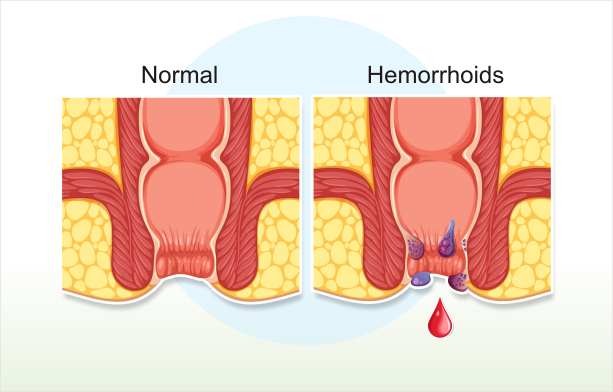hemorrhoids
Hemorrhoids are one of the most common and nagging rectal disorders. Although troublesome, hemorrhoids are rarely serious and often clear up by themselves or with minimal treatment. Treatment typically is simple and effective and may include pain-free ligation or “banding” which can be done in an office setting. More serious cases may require surgery. People with hemorrhoids who work closely with their physician are usually assured a good outcome and relief from this common disorder.
FAQ
What causes hemorrhoids?
Common causes include straining during bowel movements, chronic constipation or diarrhea, obesity, pregnancy, and a sedentary lifestyle. Genetic factors and aging can also contribute.
What are the symptoms of hemorrhoids?
Symptoms can include rectal bleeding, pain or discomfort, itching, swelling, and a lump near the anus. Internal hemorrhoids may prolapse (extend outside the anal opening) during bowel movements.
How are hemorrhoids diagnosed?
Diagnosis is typically based on a physical examination and a review of medical history. In some cases, additional tests, such as a sigmoidoscopy or colonoscopy, may be recommended to rule out other conditions.
Can hemorrhoids be prevented?
Lifestyle changes can help prevent hemorrhoids. This includes maintaining a high-fiber diet, staying hydrated, avoiding prolonged sitting or straining during bowel movements, and regular exercise.
How are hemorrhoids treated at home?
Home treatments include adopting a high-fiber diet, using over-the-counter creams or suppositories, taking warm baths, and practicing good anal hygiene. It’s important to avoid straining during bowel movements.
When should I see a doctor for hemorrhoids?
It’s advisable to see a doctor if you experience persistent or severe symptoms, such as excessive bleeding, significant pain, or if you notice a lump near the anus. A healthcare professional can provide an accurate diagnosis and recommend appropriate treatment.
Can hemorrhoids go away on their own?
Mild cases of hemorrhoids may resolve on their own with home treatments and lifestyle changes. However, persistent or severe cases may require medical intervention or procedures to alleviate symptoms.
What medical treatments are available for hemorrhoids?
Medical treatments include over-the-counter creams or suppositories, prescription medications, rubber band ligation (a procedure to cut off blood supply to the hemorrhoid), sclerotherapy, and surgical procedures for severe cases.
Can hemorrhoids be a sign of a more serious condition?
While hemorrhoids are generally a benign and common condition, persistent or severe symptoms can sometimes be indicative of other gastrointestinal issues. It’s essential to consult with a healthcare professional for an accurate diagnosis and appropriate treatment.


